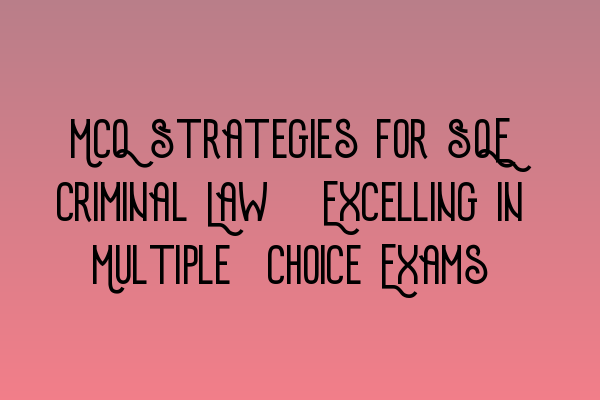MCQ Strategies for SQE Criminal Law: Excelling in Multiple-Choice Exams
Preparing for multiple-choice exams can be intimidating, especially when it comes to a complex subject like criminal law. However, with the right strategies and techniques, you can ace your SQE Criminal Law exam. In this article, we will share some valuable tips and tricks to help you excel in your MCQs.
1. Understand the Exam Format
Before diving into the study material, it’s crucial to understand the format of the SQE Criminal Law exam. The exam consists of multiple-choice questions that test your knowledge and application of criminal law principles. Familiarize yourself with the exam structure so you can effectively prepare for it.
2. Review the Key Topics
To perform well in the MCQs, focus on the key topics that are likely to be covered in the exam. Understanding the fundamental principles of criminal law is essential. Make a study plan and allocate time to cover the core areas such as actus reus, mens rea, defenses, and specific offenses.
Link: SQE 1 Preparation Courses
3. Practice with Mock Exams
Practice makes perfect, and this holds true for MCQs as well. Solve as many practice questions as possible to enhance your understanding of criminal law concepts and improve your speed and accuracy. Mock exams are especially helpful in simulating the real exam environment and identifying areas that need more attention.
Link: SQE 1 Practice Mocks FLK1 FLK2
4. Analyze Answer Choices
When facing multiple-choice questions, carefully analyze each answer choice before selecting the best option. Sometimes, two choices may seem plausible, but there is usually one that aligns more closely with the principles of criminal law. Eliminate any obviously incorrect choices to increase your chances of selecting the right answer.
5. Time Management
Managing your time effectively is critical in MCQ exams. Allocate a specific amount of time to each question and stick to it. If you’re unsure about a particular question, mark it and move on. Use the remaining time to address the easier questions and then revisit the marked ones. Prioritize your time based on the marks assigned to each question.
6. Learn from Feedback
After completing practice questions or mock exams, review your answers and learn from your mistakes. Focus on the explanations provided for incorrect answers. This will help you understand the reasoning behind the correct choices and reinforce your understanding of criminal law concepts.
Link: SQE 1 Practice Exam Questions
7. Apply Analytical Thinking
MCQs in criminal law often require analytical thinking. Instead of relying solely on memorization, apply your analytical skills to comprehend the scenarios presented in the questions. This will help you identify the correct application of legal principles and ensure accurate answers.
8. Seek Professional Guidance
While self-study is essential, seeking professional guidance can provide valuable insights and additional support. Consider enrolling in SQE 1 and SQE 2 preparation courses to enhance your understanding of criminal law and improve your MCQ performance.
Link: SQE 2 Preparation Courses
Conclusion
Mastering MCQs in SQE Criminal Law requires a combination of thorough preparation, practice, and effective strategies. By understanding the exam format, focusing on key topics, practicing with mock exams, analyzing answer choices, managing your time, learning from feedback, applying analytical thinking, and seeking professional guidance, you can excel in multiple-choice exams and pave the way for a successful career in criminal law.
For more information about SQE exams and important dates, visit the SRA SQE Exam Dates page.
